The occult, when viewed through the lens of Christianity, refers to various theories and practices involving a belief in and knowledge or use of supernatural forces or beings. These practices encompass a wide range of activities, including witchcraft, magic, alchemy, divination, astrology, and more. In Christian terms, the occult is seen as evil when it involves the breaking of moral laws, but some argue that there is no clear distinction between magic and religion.
The Western tradition of occultism has its roots in ancient secret philosophies from Hellenistic magic and alchemy, as well as Jewish mysticism. While occultism is viewed negatively in academic circles, it has had a significant influence on popular culture, inspiring books, movies, and art.
However, Christians are advised not to participate in occult practices, as they are considered abominable in the eyes of God and can lead to judgment. Instead, Christians are encouraged to seek a positive alternative in following Jesus and living according to biblical principles.
Key Takeaways:
- The occult, when viewed from a Christian perspective, involves theories and practices related to supernatural forces and beings.
- Occult practices include witchcraft, magic, alchemy, divination, astrology, and more.
- Some argue that there is no clear distinction between magic and religion in Christian terms.
- Occultism in the Western tradition is influenced by ancient secret philosophies and mystical traditions.
- Christianity advises against participating in occult practices and encourages following Jesus and biblical principles instead.
The Occult in Christian Beliefs
In Christian beliefs, the occult is often seen as encompassing practices that involve the supernatural and can be in conflict with Christian teachings. It is viewed as a realm that delves into hidden knowledge and seeks power through means that are not aligned with God’s will. The term “occult” itself comes from the Latin word “occultus,” which means “hidden” or “secret.” It refers to theories and practices related to the supernatural, including witchcraft, magic, divination, astrology, and more.
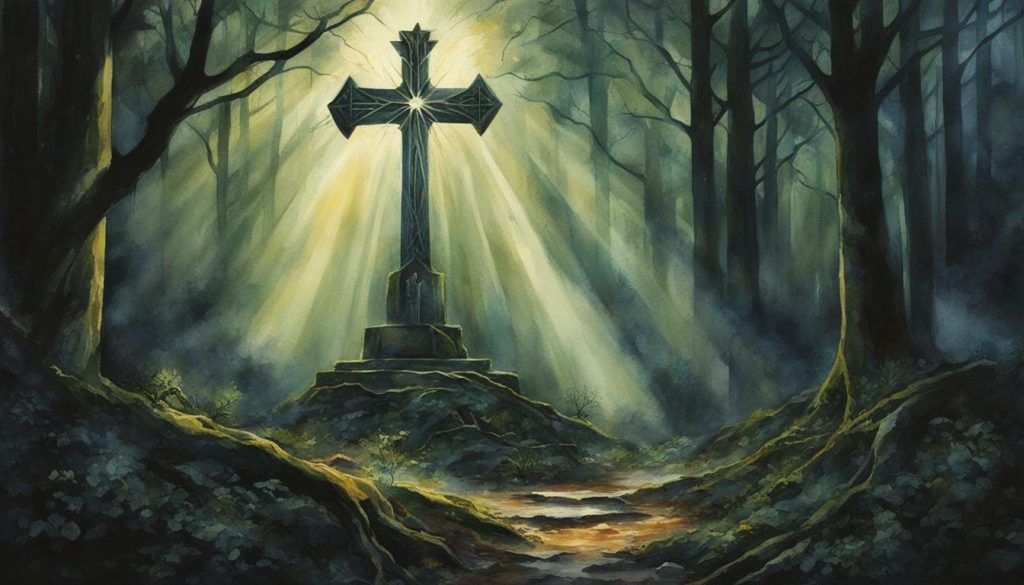
The Christian perspective on the occult is shaped by the belief that there is a clear distinction between the spiritual forces aligned with God and those aligned with evil. Occult practices that involve seeking knowledge or power from supernatural entities or forces outside of God are considered to be in direct opposition to Christian teachings. Such practices are believed to be morally wrong and can lead individuals away from a genuine relationship with God.
However, it is important to note that not all supernatural phenomena are considered occult in a negative sense. Christianity acknowledges the existence of spiritual gifts and divine intervention, but the discernment lies in recognizing whether these experiences are aligned with God’s will and in accordance with biblical principles. Christians are encouraged to discern the source of supernatural experiences and to seek guidance from spiritual leaders and the teachings of Scripture.
Occult Practices and Christian Morality
Within Christian beliefs, occult practices are generally considered to be morally wrong and are discouraged due to their potential negative consequences. Occultism involves the belief in and use of supernatural forces or beings, which can include practices such as witchcraft, magic, divination, astrology, and more. While some argue that there is no clear distinction between magic and religion, the Christian perspective views occult practices as a violation of moral laws.
In the Western tradition, occultism has its roots in ancient secret philosophies from Hellenistic magic, alchemy, and Jewish mysticism. These practices have influenced popular culture but are viewed negatively in academic circles. Despite the allure and curiosity surrounding the occult, Christians are advised not to engage in occult practices, as they are considered abominable in the eyes of God and can lead to judgment.
The Bible warns believers against participating in occult practices. In Deuteronomy 18:10-12, it states, “Let no one be found among you who sacrifices their son or daughter in the fire, who practices divination or sorcery, interprets omens, engages in witchcraft, or casts spells, or who is a medium or spiritist or who consults the dead.” These practices are seen as a form of rebellion against God and a rejection of His authority.
Instead, Christians are encouraged to seek a positive alternative in their faith by following Jesus and living according to biblical principles. This includes practicing discernment and relying on prayer, studying scriptures, and seeking guidance from spiritual leaders. By doing so, believers can cultivate a strong relationship with God and navigate the complexities of the occult in a way that aligns with their Christian values.
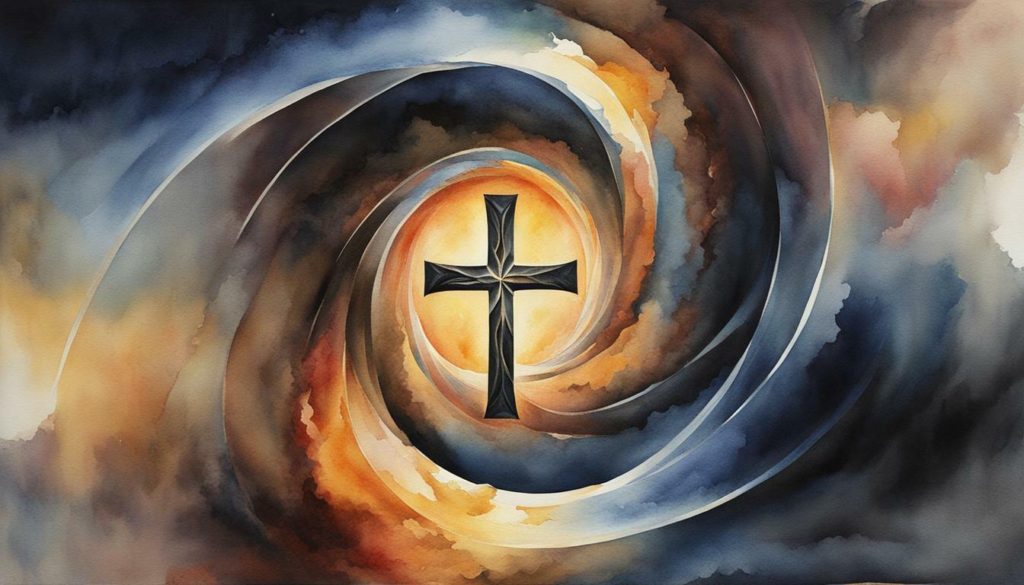
| Occult Practice | Christian Perspective |
|---|---|
| Witchcraft | Seen as a violation of God’s authority and an invitation to demonic influence. |
| Divination | Considered an attempt to gain knowledge through forbidden means, rejecting God’s sovereignty. |
| Magic | Viewed as an attempt to manipulate supernatural forces, which is contrary to relying on God’s power. |
| Astrology | Seen as an idolatrous practice, placing trust in celestial bodies rather than God’s guidance. |
In conclusion, the Christian perspective on the occult world emphasizes the moral implications and potential dangers of engaging in occult practices. Christians are encouraged to distance themselves from such practices and instead focus on building a strong relationship with God and living according to biblical principles. By doing so, believers can find fulfillment and spiritual guidance in their faith without compromising their Christian values.
The Origins of Occultism in Christianity
Occultism within Christianity can be traced back to ancient secret philosophies and mystical traditions that have influenced its development over time. These esoteric practices have roots in Hellenistic magic, alchemy, and Jewish mysticism, which were prevalent during the early centuries of the Christian era. The integration of these occult traditions into Christian beliefs and practices has shaped the way occultism is understood within the faith.
In the early years of Christianity, there was a blending of different religious and philosophical ideas, resulting in a syncretism of beliefs. This syncretism allowed for the incorporation of occult practices into Christian rituals and ceremonies. For example, the use of divination tools such as tarot cards or crystal balls became common among certain sects of Christianity.
However, as the Christian faith evolved, occult practices and beliefs began to be viewed with increasing skepticism and condemnation. The Church gradually distanced itself from esoteric ideologies and deemed them incompatible with Christian teachings. The occult was seen as a threat to the purity of faith and a gateway to demonic influences.
The Influence of Occultism on Christian History
Despite the Church’s disapproval, occultism continued to have an impact on Christian history. The occult found its way into various aspects of art, literature, and architecture, with symbols and motifs representing hidden knowledge and mystical traditions. These influences can still be seen today in sacred Christian symbols such as the Tree of Life or the Rose Cross.
Additionally, occultism played a significant role in the development of Western esotericism, which encompasses practices like alchemy, astrology, and ceremonial magic. Some Christian mystics and scholars of the Middle Ages and Renaissance sought to reconcile occult teachings with Christian theology, attempting to merge the mystical and the divine.
While some individuals throughout history have sought to reconcile occultism and Christianity, the majority of Christian denominations reject the practice of occultism. This rejection is rooted in the belief that occult practices divert attention away from the true teachings of Jesus Christ and place individuals at risk of spiritual harm.
Ultimately, occultism within Christianity represents a complex and controversial topic that continues to be debated and discussed in theological circles. The tension between occult practices and Christian beliefs raises questions of morality, spirituality, and the boundaries of faith. As Christians, it is important to approach these discussions with discernment, seeking guidance from scripture and prayer to navigate the complexities of the occult in a way that aligns with our faith.
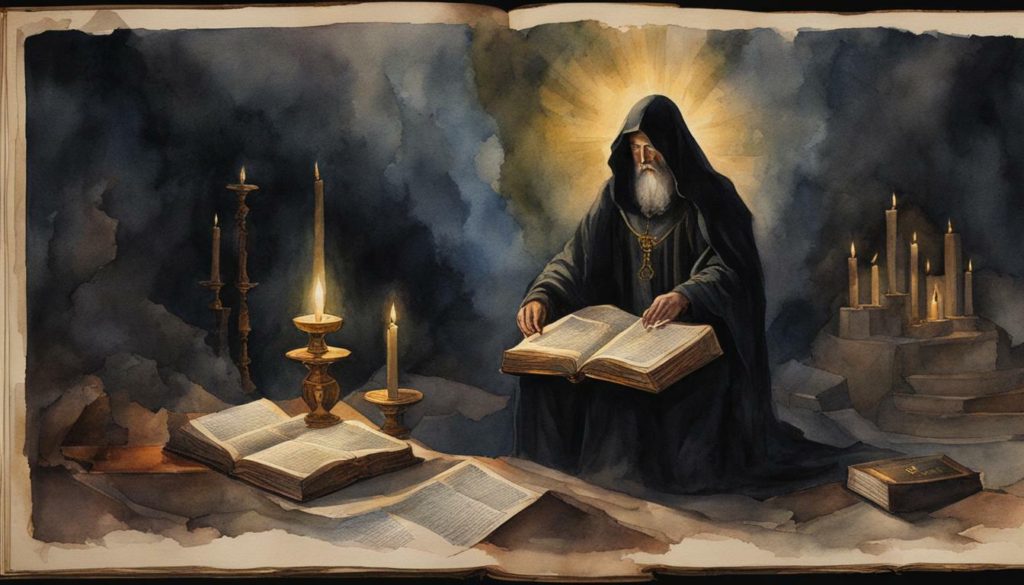
Throughout history, the occult has been viewed differently within Christianity, with varying perspectives influencing its perception in both academic and popular realms. The term “occult” originates from the Latin word “occultus,” meaning “hidden” or “secret.” In Christian terms, the occult refers to theories and practices involving supernatural forces or beings that are often associated with magic, witchcraft, divination, astrology, and more.
“The occult is seen as evil when it involves the breaking of moral laws, but some argue that there is no clear distinction between magic and religion.”
The Western tradition of occultism traces its roots back to ancient secret philosophies from Hellenistic magic and alchemy as well as Jewish mysticism. These mystical traditions influenced the development of various occult practices and beliefs. While occultism is viewed negatively in academic circles and often associated with superstition, it has also had a significant impact on popular culture, inspiring literature, art, and even music.
“Occultism is a fascinating subject that has captivated the minds of people throughout history. It is a realm that exists on the fringes of conventional understanding, offering a sense of mystery and intrigue.”
However, Christians are advised not to engage in occult practices, as they are considered abominable in the eyes of God and can lead to judgment. The Bible includes numerous warnings against involvement in the occult, emphasizing the importance of seeking a positive alternative in following Jesus and living according to biblical principles.
| Occult Practices | Biblical Warnings |
|---|---|
| Witchcraft | Deuteronomy 18:10-12 |
| Divination | Leviticus 19:26 |
| Astrology | Isaiah 47:13-15 |
| Mediumship | Leviticus 20:27 |
While the exploration and understanding of the occult may be of interest, it is essential for Christians to approach the subject with discernment and adhere to biblical teachings. By doing so, they can navigate encounters with the occult in a way that aligns with their faith and safeguards against potential spiritual dangers.
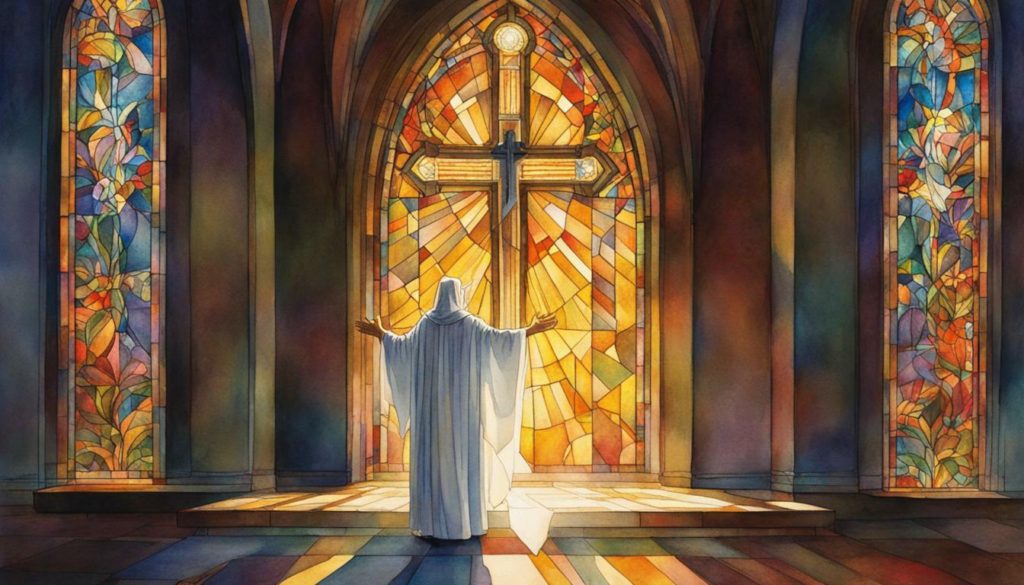
Biblical Warnings Against Occult Practices
The Bible strongly warns Christians against participating in occult practices and emphasizes the negative spiritual consequences associated with such actions. In Christian terms, the occult encompasses a wide range of theories and practices involving supernatural forces or beings. These include witchcraft, magic, alchemy, divination, astrology, and more. While some argue that there is no clear distinction between magic and religion, the occult is seen as evil when it involves the breaking of moral laws.
“Do not turn to mediums or seek out spiritists, for you will be defiled by them. I am the Lord your God.” – Leviticus 19:31
In Leviticus 19:31, God explicitly forbids seeking out mediums or spiritists, warning that doing so will result in defilement. Similarly, Deuteronomy 18:10-12 cautions against engaging in occult practices, stating that those who do so are detestable in the eyes of the Lord. These biblical warnings highlight the spiritual dangers and consequences associated with participating in the occult.
“For rebellion is like the sin of divination, and arrogance like the evil of idolatry.” – 1 Samuel 15:23
1 Samuel 15:23 equates rebellion with divination and idolatry, further emphasizing the negative spiritual implications of involving oneself in occult practices. The Bible consistently portrays occultism as contrary to God’s will and warns against its allure.
As Christians, it is important to heed these biblical warnings and avoid any involvement in occult practices. Instead, we should seek a positive alternative in following Jesus and living according to biblical principles. By focusing on our relationship with God and growing in faith, we can find true fulfillment and spiritual guidance without venturing into the dangerous territory of the occult.

| Occult Practices | Relevance to Christianity |
|---|---|
| Witchcraft | Contradicts the belief in God’s sovereignty and invokes power from sources other than God. |
| Magic | Relies on supernatural forces apart from God’s power and undermines faith in His providence. |
| Divination | Seeks knowledge of the future or hidden information through means that go against God’s plan and wisdom. |
| Astrology | Places trust in the alignment of stars and planets instead of trusting in God’s guidance and sovereignty. |
| Alchemy | Promotes the pursuit of immortality or the transformation of matter through means that disregard God’s divine plan. |
Seeking a Positive Alternative
Instead of engaging in occult practices, Christians are encouraged to seek a positive alternative in following Jesus and living according to biblical principles. The occult, with its various theories and practices involving supernatural forces, goes against Christian beliefs and is seen as abominable in the eyes of God. As believers, we are called to uphold moral laws and embrace a relationship with God grounded in love, grace, and truth.
While occultism has influenced popular culture and academia, it is important for Christians to exercise discernment and protect their spiritual well-being. The pursuit of the occult can lead to spiritual dangers and conflicts with biblical teachings. As the apostle Paul writes in his letter to the Ephesians, “For our struggle is not against flesh and blood, but against the rulers, against the authorities, against the powers of this dark world and against the spiritual forces of evil in the heavenly realms” (Ephesians 6:12, NIV). We are called to stand firm in our faith and resist the temptations of the occult.
Instead, we should focus on deepening our relationship with Jesus and living according to the teachings of the Bible. The Bible provides guidance on how to navigate the challenges of life and offers a moral compass. By studying scripture, praying, and seeking guidance from spiritual leaders, we can find peace, purpose, and fulfillment in Christ. As Jesus himself said, “I am the way and the truth and the life” (John 14:6, NIV). By following Jesus and aligning our lives with his teachings, we can find the true source of light and spiritual fulfillment.
In conclusion, as Christians, we are called to reject the occult and instead seek a positive alternative in following Jesus and living according to biblical principles. The occult may offer enticing promises, but it ultimately leads to spiritual darkness and separation from God. Let us embrace the truth and light of Christ and find our solace, guidance, and fulfillment in him.

From a Christian perspective, engaging in occult practices raises moral concerns due to the potential conflicts with biblical teachings. The occult is seen as evil when it involves the breaking of moral laws, as it often promotes a belief in supernatural forces or beings that are not aligned with God’s principles. In fact, the Bible explicitly warns against participating in occult practices, considering them abominable in the eyes of God and leading to judgment.
As Christians, we are called to live in accordance with biblical principles, which emphasize a relationship with God and adherence to His commandments. Occult practices often involve seeking power or knowledge through means that are outside of God’s design for us. This can lead to spiritual confusion, deception, and even bondage. The Bible warns us against such practices, as seen in verses like Deuteronomy 18:10-12, which specifically condemns those who practice divination, witchcraft, sorcery, and the casting of spells.
Instead of engaging in occult practices, Christians are encouraged to seek a positive alternative in following Jesus and living a life that is aligned with biblical principles. This includes cultivating a deeper relationship with God through prayer, studying scripture, and seeking guidance from spiritual leaders who can provide wisdom and discernment. By focusing on a relationship with God and His teachings, Christians can find true fulfillment and experience the blessings that come from living in harmony with His will.
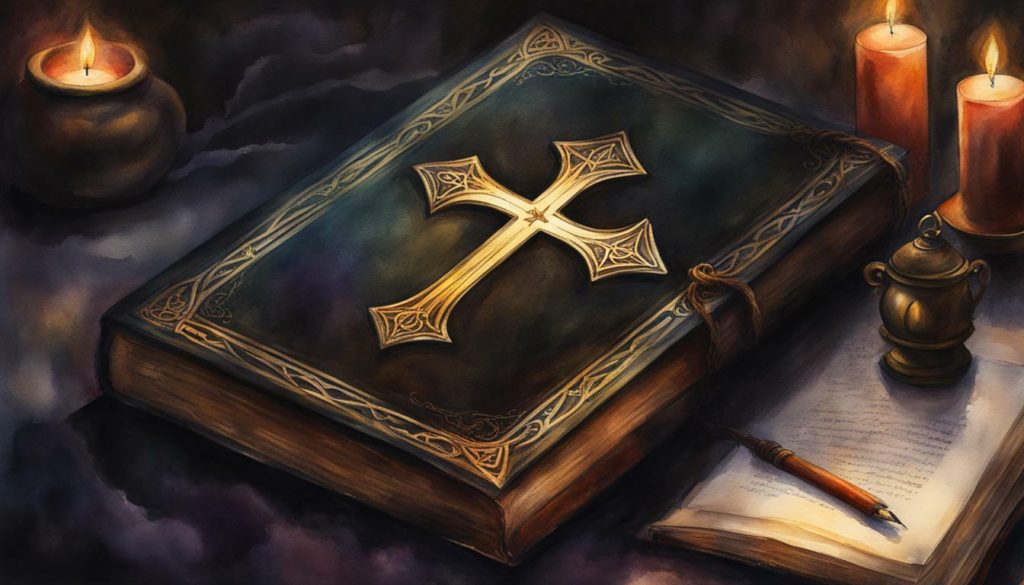
| Occult Practices | Christian Perspective |
|---|---|
| Witchcraft | Considered an abomination to God. (Deuteronomy 18:10-12) |
| Divination | Seen as a form of seeking knowledge or guidance outside of God’s plan. (Jeremiah 14:14-16) |
| Astrology | Believed to place trust in the stars rather than God’s sovereignty. (Isaiah 47:13-14) |
| Magic | Considered a form of deception and manipulation. (Exodus 7:11-12) |
| Alchemy | Viewed as attempting to control or transform reality outside of God’s will. (Romans 1:22-25) |
“For rebellion is as the sin of witchcraft,
And stubbornness is as iniquity and idolatry.
Because you have rejected the word of the Lord,
He also has rejected you from being king.”
– 1 Samuel 15:23
In conclusion, it is essential for Christians to approach the occult with caution and discernment, understanding its potential moral implications and conflicts with biblical teachings. By seeking a deeper relationship with God and living according to His principles, Christians can find true spiritual fulfillment and avoid the dangers associated with occult practices.
The Role of Discernment in Christianity
Within Christianity, the exercise of discernment is vital in differentiating between occult practices and genuine spiritual experiences. In our journey of faith, we are called to be wise and discerning, carefully examining our choices and actions in light of God’s word. As the apostle Paul reminds us, “Test everything; hold fast what is good” (1 Thessalonians 5:21 ESV).
Discernment involves seeking guidance from the Holy Spirit and aligning our thoughts and actions with biblical teachings. It requires careful scrutiny of the practices and beliefs we encounter, evaluating them against the truth revealed in God’s word. This discernment is crucial when it comes to navigating the intricate realm of the occult.
While the occult may have a certain allure or promise of hidden knowledge, Christians are called to exercise caution and discernment in their approach. The occult often entices with promises of power, insight, and control, but these are counterfeit substitutes for the blessings and guidance that come from a relationship with God. As John warns, “Do not believe every spirit, but test the spirits to see whether they are from God” (1 John 4:1 ESV).
| Key Verse | Key Message |
|---|---|
| “Test everything; hold fast what is good” – 1 Thessalonians 5:21 ESV | In our pursuit of spiritual truth, it is crucial to exercise discernment and cling to what is good, aligning ourselves with God’s word. |
| “Do not believe every spirit, but test the spirits to see whether they are from God” – 1 John 4:1 ESV | Christians are called to evaluate and discern the sources of spiritual influence, discerning whether they align with biblical teachings. |
“Discernment involves seeking guidance from the Holy Spirit and aligning our thoughts and actions with biblical teachings.”
As Christians, we are reminded that our faith is not based on secret knowledge or mystical practices. Our foundation is built upon the person of Jesus Christ and the revealed truth of Scripture. In Him, we find the source of true spiritual wisdom and discernment. As Paul writes, “In Christ are hidden all the treasures of wisdom and knowledge” (Colossians 2:3 ESV).
Therefore, let us embrace discernment as an essential tool for navigating the occult. By studying and meditating on God’s word, seeking the guidance of the Holy Spirit, and consulting trusted spiritual leaders, we can distinguish between the counterfeit allure of the occult and the genuine spiritual experiences that God desires for us.

Through discernment, we can safeguard our hearts and minds, keeping them focused on Christ and His truth. Let us be wise and discerning, rooted in the Word of God, and guided by the Holy Spirit as we navigate the complexities of the occult in a Christian context.
Key Takeaways
- Discernment is essential in differentiating between occult practices and genuine spiritual experiences within Christianity.
- We are called to test everything against the truth revealed in God’s word.
- Discernment requires seeking guidance from the Holy Spirit and aligning our thoughts and actions with biblical teachings.
- Our foundation as Christians is in Jesus Christ and the revealed truth of Scripture.
- Through discernment, we can distinguish between the allure of the occult and the genuine spiritual experiences that God desires for us.
Addressing Misconceptions about the Occult
There are many misconceptions surrounding the occult, and it is important for Christians to have a clear understanding of the subject based on biblical teachings. The occult is often associated with evil practices and dark forces, but in reality, it encompasses a wide range of beliefs and practices that are not inherently negative. It is crucial to differentiate between occult practices that involve the supernatural and those that go against Christian morals and principles.
One common misconception is that all occult practices are inherently demonic and sinful. While some occult practices may indeed involve the invocation of spiritual entities or supernatural powers, not all of them are intended to harm or go against God’s will. It is important to remember that true occultism, as understood from a Christian perspective, is distinct from witchcraft, black magic, and other nefarious practices that explicitly seek to harm others or manipulate spiritual forces for personal gain.
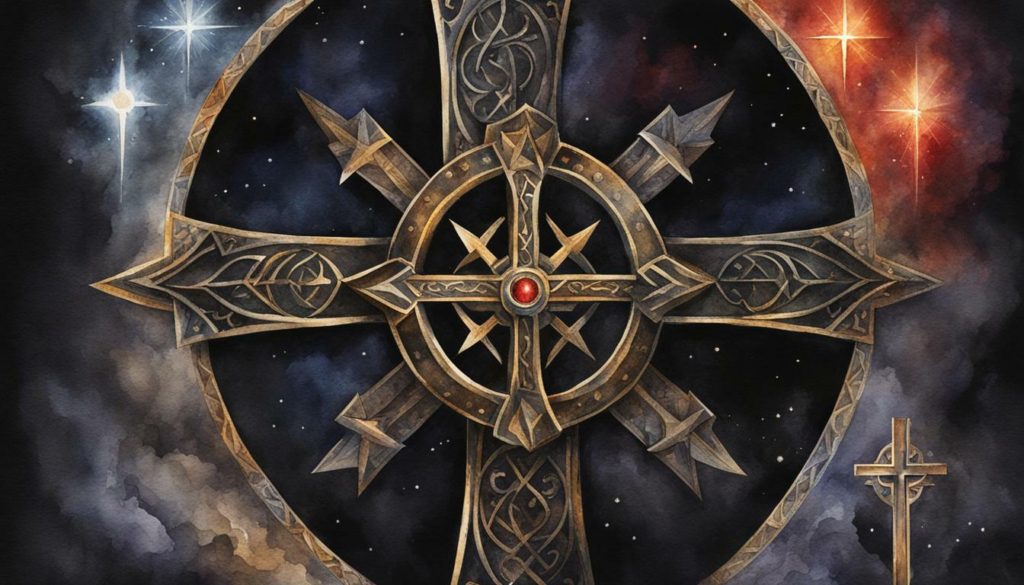
Furthermore, it is essential to recognize that occult practices have influenced various aspects of human history, including art, literature, and philosophy. Many renowned thinkers, artists, and writers have drawn inspiration from occult traditions and ancient wisdom, seeking to explore the mysteries of existence and deepen their understanding of the world. However, Christians are advised to approach these influences with caution and discernment, as they can often present conflicting ideas and beliefs that go against biblical teachings.
In conclusion, Christians should avoid dismissing the entire occult realm as inherently evil or demonic. Instead, it is vital to approach the subject with an open mind, seeking understanding within the context of Christian beliefs. By studying and discerning the true nature of occult practices, Christians can navigate encounters with the occult in a way that aligns with their faith and avoids compromising their relationship with God. It is through prayer, seeking guidance from spiritual leaders, and grounding oneself in biblical teachings that Christians can develop a clear and informed perspective on the occult.
Navigating the Occult in a Christian Context
In a Christian context, it is important for believers to navigate encounters with the occult by relying on prayer, studying scripture, and seeking guidance from spiritual leaders. The occult, with its practices and beliefs rooted in supernatural forces and beings, is seen as contradictory to the teachings of Christianity. As Christians, we are called to discern and avoid any involvement in occult practices that go against the moral laws set by God.
Prayer serves as a powerful tool for Christians when faced with the temptation or curiosity of the occult. By seeking the guidance of the Holy Spirit through prayer, we can receive clarity, wisdom, and protection. The Bible also provides valuable guidance in navigating the occult, as it contains warnings against engaging in such practices. Studying scripture allows us to understand and apply God’s truth to our lives, enabling us to discern between what aligns with His teachings and what does not.
Additionally, seeking guidance from spiritual leaders, such as pastors or mentors, can offer valuable insights and accountability in navigating encounters with the occult. These leaders can provide biblical perspective, counsel, and support as we navigate the complexities and potential dangers of the occult. By surrendering ourselves to their guidance, we can better protect ourselves and remain faithful to our Christian beliefs.
| Key Steps to Navigate the Occult in a Christian Context |
|---|
| 1. Engage in fervent prayer, seeking guidance from the Holy Spirit. |
| 2. Study and meditate on scripture to gain a solid foundation of biblical truth. |
| 3. Seek guidance from trusted spiritual leaders who can provide insight and accountability. |
| 4. Stay connected to a supportive Christian community for encouragement and prayer. |
Remember, as Christians, our focus should always be on pursuing an intimate relationship with Jesus and living a life that reflects His love and teachings. Engaging in occult practices can lead us away from God’s plan for us and open doors to spiritual darkness. Let us prioritize prayer, scripture, and spiritual guidance as we navigate encounters with the occult and remain faithful to our Christian beliefs.

Conclusion
In conclusion, understanding the occult from a Christian perspective is essential in order to navigate its complexities and potential spiritual dangers. In Christian terms, the occult encompasses various beliefs and practices involving supernatural forces or beings, such as witchcraft, magic, divination, and astrology. While some argue that there is no clear distinction between magic and religion, the occult is generally viewed as evil when it involves the breaking of moral laws.
The roots of occultism within Christianity can be traced back to ancient secret philosophies, including Hellenistic magic, alchemy, and Jewish mysticism. While occultism is viewed negatively in academic circles, it has had a significant influence on popular culture. However, Christians are advised against participating in occult practices, as they are considered abominable in the eyes of God and can lead to judgment.
Instead, Christians are encouraged to seek a positive alternative by following Jesus and living according to biblical principles. Discernment is crucial in distinguishing between occult practices and genuine spiritual experiences. It is important to rely on prayer, study Scripture, and seek guidance from spiritual leaders to navigate encounters with the occult in everyday life.
By understanding the occult from a Christian perspective, we can equip ourselves with the knowledge and discernment needed to make wise choices and remain steadfast in our faith.
FAQ
What is the occult in Christian terms?
In Christian terms, the occult refers to various theories and practices involving a belief in and knowledge or use of supernatural forces or beings. These practices include witchcraft, magic, alchemy, divination, astrology, and more.
Is the occult considered evil in Christianity?
The occult is seen as evil when it involves the breaking of moral laws, but some argue that there is no clear distinction between magic and religion.
Where does the Western tradition of occultism come from?
The Western tradition of occultism is rooted in ancient secret philosophies from Hellenistic magic and alchemy and Jewish mysticism.
How has the occult influenced popular culture?
Occultism has influenced popular culture, but it is viewed negatively in academic circles.
Should Christians participate in occult practices?
Christians are advised not to participate in occult practices, as they are considered abominable in the eyes of God and lead to judgment. Instead, Christians should seek a positive alternative in following Jesus and living according to biblical principles.

